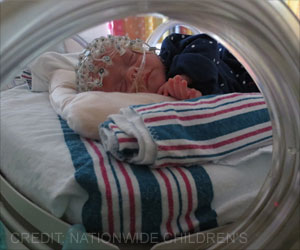
‘Using antibiotic shunts benefit patients having surgery for hydrocephalus of all ages by reducing the risk and harm of shunt infection.
’
Read More..Tweet it Now
Babies born with hydrocephalus (congenital) and adults or children who develop it (acquired) usually need prompt treatment to reduce the pressure on their brain. This is usually done with a shunt. Read More..
During surgery, a thin tube called a shunt is implanted in the brain. The excess cerebrospinal fluid (CSF) in the brain flows through the shunt to drain into the abdominal cavity where is absorbed. Approximately 1300 new shunts (UK shunt registry) are inserted in the UK each year.
Unfortunately, shunt infection affects up to 15% of patients having shunt surgery and is more common in children and neonates. Shunt infection is a serious complication that can lead to meningitis, weeks in the hospital, prolonged antibiotics, the need for further surgery and irreversible brain injury.
A team of scientists from the University of Nottingham, led by Professor of Surgical Infection Roger Bayston, developed a novel process (Bactiseal®) that allows brain shunts to be impregnated with antibiotics during manufacture.
A team of researchers from the University of Liverpool, Alder Hey Children’s NHS Foundation Trust and The Walton Centre NHS Foundation Trust conducted the largest - ever clinical trial for hydrocephalus to test the infection-reducing properties of Bactiseal®. The BASICS trial (British Antibiotic and Silver Impregnated Catheters for ventriculoperitoneal Shunts) was funded by the National Institute for Health Research (NIHR) and cost £2.3M. Over 1600 patients with hydrocephalus took part, across 21 UK neurosurgery centers. The study took seven years (2012-2019) to complete.
Advertisement
The Chief investigators were Professor Conor Mallucci, Paediatric Neurosurgeon at Alder Hey Children’s Hospital Trust, and Michael Jenkinson, Reader in Neurosurgery at the University of Liverpool and Consultant Neurosurgeon at The Walton Centre. The study was coordinated by Professor Carrol Gamble and run by the University of Liverpool’s Clinical Trials Research Centre.
Advertisement
Michael Jenkinson said: "The BASICS study shows that antibiotic shunts reduce the risk of infection for all patients having shunt surgery for hydrocephalus. If we use antibiotic shunts routinely, we really can ’get it right first time’ by avoiding harm and delivering better outcomes for all our patients."
Roger Bayston, said: "The antibiotic shunts have now been shown in a well-designed randomized controlled trial to reduce infection in hydrocephalus shunts significantly. This is a major step forward in the treatment of this condition, which can affect newborn babies and adults alike, and will reduce the need for surgery and for antibiotic treatment and will save healthcare costs."
The full paper, entitled ’Antibiotic or silver versus standard ventriculoperitoneal shunts (BASICS): a multicentre, single-blinded, randomized trial and economic evaluation,’ can be found on The Lancet website once the embargo has lifted.
Source-Eurekalert













